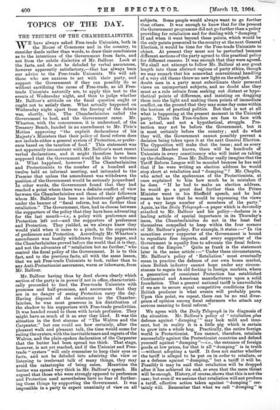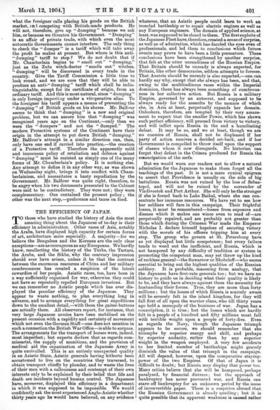TOPICS OF THE DAY.
THE TRIUMPH OF THE CHAMBERLAINITES.
WE have always asked Free-trade Unionists, both in the House of Commons and in the country, to consider deeds rather than words, to draw their conclusions as to the intentions of the Government from facts, and not from the subtle dialectics of Mr. Balfour. Look at the facts, and do not be deluded by verbal assurances, however apparently satisfactory,—that has always been our advice to the Free-trade Unionists. We will ask support the Government if they can possibly do so without sacrificing the cause of Free-trade, as all Free- trade Unionists naturally are, to apply this test to the events of Wednesday night, and then to judge whether Mr. Balfour's attitude on the fiscal question ought or ought not to satisfy them. What actually happened on Wednesday night apart from the fencing of the debate was, shortly, this. The Chamberlainites called the Government to heel, and the Government came. Mr. Wharton, with the concurrence, it is understood, of the Treasury Bench, handed in an amendment to Mr. Pine's Motion approving 'the explicit declarations of his Majesty's Ministers that their policy of fiscal reform does not include either a general system of Protection, or prefer- ence based on the taxation of food." This statement was not apparently inconsistent with Mr. Balfour's most recent verbal declarations, and it might therefore have been supposed that the Government would be able to welcome it. W'nat happened, however ? The Chamberlainites and Protectionists to the number of a hundred and twelve held an informal meeting, and intimated to the Premier that unless the amendment was withdrawn the position of the Government would be seriously jeopardised In other words, the Government found that they had reached a point where there was a definite conflict of view between the Chamberlainites and those of their followers whom Mr. Balfour has been so industriously gathering under the banner of "fiscal reform, but no further than retaliation." The Government, then, had to choose between the supporters of the policy that they have been advocating for the last month—i.e., a policy with preference and Protection left out—and the supporters of preference and Protection. They yielded, as we always knew they would yield when it came to a pinch, to the supporters of preference and Protection. Accordingly Mr. Wharton's amendment was hastily withdrawn from the paper, and the Chamberlainites proved before the world that it is they, and not the advocates of "retaliation but no further," who control the fiscal policy of the Government. It is to this fact, and to the previous facts, all with the same lesson, that we ask Free-trade Unionists to look, rather than to any Anti-Protectionist assurances, warm or lukewarm, from Mr. Balfour.
Mr. Balfour having thus by deed shown clearly which section of the party is in power if not in office, characteristi- cally proceeded to feed the Free-trade Unionists with promises and half-promises, and assurances that they are in no danger of seeing Protection carry the day. Having disposed of the substance to the Chamber- lainites, he was most generous in his distribution of the shadow to his supporters with Free-trade proclivities. It was handed round to them with lavish profusion. They might have as much of it as ever they liked. It was the situation in the first stanzas of "The Walrus and the Carpenter," but one could see how certainly, after the pleasant walk and pleasant talk, the time would come for eating the oysters, with the inevitable tears and regrets of the Walrus, and the plain-spoken declaration of the Carpenter that the butter had been spread too thick. That stage, however, is not yet reached, and if the Unionist and Free- trade " oysters " will only remember to keep their eyes on facts, and not be deluded into admiring the view or listening to irrelevant talk of many things, they may avoid the catastrophe of being eaten. Meantime the butter was spread very thick in Mr. Balfour's speech. He argued that those who were strongly opposed to preference and Protection need nevertheless have no fear of further- ing these things by supporting the Government. It was impossible in a party to expect unanimity of view on all subjects. Some people would always want to go further than others. It was enough to know that for the present the Government programme did not go further than a policy providing for retaliation and for dealing with "dumping." If and when it went beyond these points, which would be the only points presented to the country at the next General Election, it would be time for the Free-trade Unionists to object. At present they must not be perturbed because different sections of the party agreed to this practical policy for different reasons. It was enough that they were agreed. We shall not attempt to follow Mr. Balfour at any great length into these abstract regions of party ethics, though we may remark that his somewhat conventional handling of a very old theme threw no new light on the subject. No doubt men in a party must subordinate their personal views on unimportant subjects, and no doubt also they must as a rule refrain from seeking out distant or hypo- thetical points of difference, and insisting on dragging them into the light and making them points of immediate conflict, on the ground that they may some day come within the horizon of practical politics. But that is not at all what is happening at the present moment in the Unionist party. There the Free-traders are face to face with an actual, and not a hypothetical, struggle. Pro- tection may not be before the Government, but it is most certainly before the country ; and do what they will, the Government cannot possibly prevent a decision being taken upon it at the next General Election. The Opposition will make that the issue ; and as every Unionist Member knows, there will be hundreds of Unionists in every constituency who will insist on taking up the challenge. Does Mr. Balfour really imagine that the Tariff Reform League will be muzzled because he has said that if he were writing an election address he would stop short at retaliation and " dumping " ? Mr. Chaplin, who acted as the spokesman of the Protectionists, at once explained to him how much he is mistaken if he does. " If he had to make an election address, he would go a great deal further than the Prime Minister went in his Sheffield speech, and he had reason to know that he would be expressing the views of a very large number of members of the party." Again;as the Daily Telegraph—a paper which is devotedly attached to Mr. Balfour and his policy—declares in a leading article of special importance in its Thursday's issue, the Chamberlainites do not in the least feel themselves compelled to keep within the four corners of Mr. Balfour's policy. For example, it states :—" In the meantime every supporter of the Government is bound to repudiate free imports, and every supporter of the Government is equally free to advocate the fiscal federa- tion of the Empire." Quite as frank is the statement later in the same article :—" Under these circumstances, Mr. Balfour's policy of 'Retaliation' must eventually mean in practice the defence of our own home market, since British industry cannot hope under any circum- stances to regain its old footing in foreign markets, where a generation of consistent Protection has established Continental and American manufacturers upon a solid foundation. That a general national tariff is unavoidable if we are to secure equal competitive conditions for the British producer is what events will probably prove. Upon this point, we repeat, there can be no real diver- gence of opinion among fiscal reformers who attach any serious meaning to fiscal reform."
We agree with the Daily Telegraph in its diagnosis of the situation. Mr. Balfour's policy of "retaliation plus defence against dumping ! " may look mild and inno- cent, but in reality it is a little pig which is certain to grow into a whole hog. Practically, the entire foreign world is Protectionist. You cannot, therefore, retaliate successfully against the Protectionist countries and defend yourself against "dumping "—i.e., the entrance of foreign goods at low prices, for that is all "dumping" is in truth —without adopting a tariff. It does not matter whether the tariff is alleged to be put on in order to retaliate, or as a defence against "dumping," but a tariff it will be. Possibly it may be said that retaliation will be dropped after it has achieved its end, or even that the mere threat will be enough. History, of course, shows that this is not the case; but even if we assume that retaliation will not produce a tariff, effective action taken against " dumping " cer- tainly will. Remember that what we call "dumping" is what the foreigner calls placing his goods on the British market, enl competing with British-made products. He will not, therefore, give up " dumping " because we ask him, or because we threaten his Government. "Dumping" is an affair of private trade, with which even the most autocratic Governments cannot interfere. The only thing to check the " dumper " is a tariff which will take away the profit he makes at present. But where is this anti- " dumping" tariff to stop ? We do not doubt that if Mr. Chamberlain begins to "smell out" "dumping," just as the Zulu witch-doctor "smells out" witches, " dumping " will be discovered in every trade in the country. Give the Tariff Commission a little time to look round, and we are sure that they will be able to produce an anti-" dumping" tariff which shall be indis- tinguishable, except for its certificate of origin, from an ordinary tariff. And this is most natural, since "dumping" is only 'foreign importing under a viteperative alias. To the foreigner his tariff appears a means of preventing the " dumping " of British goods on his shores. Mr. Balfour seems to think that " dumping " is a new and original problem, but we can assure him that " dumping " was recognised years ago on the Continent,—only then we were the " dumpers " and not the "dumped." The modern Protective systems of the Continent have their origin in the attempt to put down British "dumping." Mr. Balfour's attempt in a similar direction can, then, only have one end if carried into practice,—the creation of a Protective tariff. Therefore the apparently mild and innocuous policy of retaliation and defence against " dumping " must be resisted as simply one of the many forms of Mr. Chamberlain's policy. It is nothing else. Any attempt to define it in any other way, as was shown on Wednesday night, brings it into conflict with Chem- berlainism, and necessitates a hasty repudiation by the Government. Mr. Balfour was quite right, therefore, to be angry when his two documents presented to the Cabinet were said to be contradictory. They were not ; they were complementary. One contained the present policy ; the other was the next step,—preference and taxes on food.











































 Previous page
Previous page